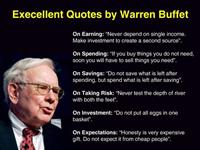
Berkshire Hathaway Chairman and CEO Warren Buffett, is an exceptional role model if one wants to imitate the classic value investing style. During the early years of his great investing career Buffet said "I'm 85% Benjamin Graham." Graham is deemed as the godfather of value investing who initiated the concept of intrinsic value – the underlying fair value of a stock based on its future earnings power.
Nonetheless, Buffett’s investment approach is more qualitative and intensive as compared to Graham. He prefers potent businesses which have fair valuations and posses the potential for large growth whereas Graham favored undervalued, mediocre firms and would then expand his holdings among them.

Buffett's Investing Style
Buffett's formulas interestingly look fairly simple and cliché but can be difficult to execute. Buffett basically uses twelve investing tenets to make his decisions. These are grouped in the areas of business, management, financial measures and value. For example, one principle questions if management is candid with shareholders. Conversely, there is Economic Added Value ( EVA) [ EVA is a laundry list of adjustments ]which is a fascinating example of the reverse scenario; concepts that appear complicated but are easily executable.
"The Buffett Way" is a conventional method of investing that is also flexible; resulting in its its phenomenal success. Day traders may need firm discipline and adherence to a formula, but it can be argued that successful investors have to be willing to adapt their conceptual models to current environments.
Business Tenets
Buffett strongly believes that an inherent understanding of the operating business is essential to have a viable forecast of the future performance which is why he firmly limits himself to his “circle of competence” - businesses which he can comprehend and analyze. For example, when the tech bubble burst in the early 2000s, Buffet did not suffer great losses as he wasn't heavily invested in dot-com stocks. The main goal of his business tenets is to produce a robust projection. Primarily, analyze the business, not the market or the economy or investor sentiment. Next, search for a steady operating history. Finally, utilize that data to establish whether the business has beneficial long-term prospects.
Management Tenets
Evaluation of management quality is perhaps the most difficult analytical task but is extremely important. Here are his three management tenets:
- If the management is rational: It is important that the management of the company sagely reinvests the earnings and returns the profits to the shareholders as dividends; and doesn't focus on retaining profits to build their empire and seek scale.
- Management’s honesty with its shareholders.
- Lastly, if the management refrains from mindlessly duplicating the schemes and strategies of their peers/ competitors.It is key that you draw a fine line between parameters , like between lemming like imitation of competitor strategy and circumvent a company that is first to market.
Financial Tenets
“Buffettology” pivots on return on equity (ROE) instead of earnings per share. Many investors might argue that ROE is theoretically subservient to return on assets( ROA) or return on capital employed (ROCE) as ROE can be contorted by leverage ( a debt-to-equity ratio). [ ROA= earnings produced for all capital providers/ Equity contributed to the business ]. However, Buffett favours low-leverage firms and appraises leverage separately. He also seeks high profit margins.
His final two financial principals share theoretical fundamentals with EVA. First, Buffett analyzes "owner's earnings," which is essentially cash flow accessible to shareholders. Buffett elucidates it as net income plus depreciation, depletion, amortization and other non-cash charges minus capital expenditures (CAPX) minus additional working capital (W/C) needs. This equation is similar to EVA before you subtract the shareholders equity charge. So, basically with owners' earnings, Buffett analyzes a company's ability to generate cash for shareholders.
Buffett also has a "one-dollar premise," which essentially means that every dollar of retained earnings must generate one dollar of market value.
Value Tenets
Ben Graham once said “ price is what you pay, value is what you get”. Hence this principle of Buffet analyzes the intrinsic value of the company. Buffett strongly recommends to ignore the short-term market volatility and focus on long-term returns
A truly exceptional business ought to have an enduring "moat" that safeguards brilliant returns on invested capital .“Moat”is a buisness’ ability to retain competitive advantage in order to maintain its long term profits and market share from its competing firms. Any business "castle" which is earning high returns will be consistently punched by its competitors . Therefore an intimidating barrier such as a company's being the low cost producer (GEICO, Costco) or having a powerful world-wide brand (Coca-Cola, Gillette, American Express) is vital for prolonged success. Business history is filled with "Roman Candles," companies whose moats proved delusive and were soon crossed. A moat that needs to be consistently rebuilt will eventually be no moat at all.
Companies prone to swift and continuous change are ruled out from his “enduring” criteria.Though capitalism's "creative destruction" is extremely favorable for society, investment certainty is prevented .Buffett discounts the projected earnings at the risk-free rate, claiming that the "margin of safety" in carefully applying his other principles presupposes the minimization, if not the virtual elimination, of risk.
The Bottom Line
In essence, Buffett's principles, a foundation in value investing, is also adaptable to the changing times. But in recent times stable operating histories are difficult to find, and intangibles play a bigger role in the firm’s value thus making the analysis of a business quite challenging.
Buffett encourages small investors to buy a low-cost S&P 500 index fund instead of individual stocks. However, if one wants to buy individual stocks, follow “The Buffet way” and you will be on track to earn solid returns on your portfolio.
written by Ankita on May 13 2018 from Lagos, Nigeria